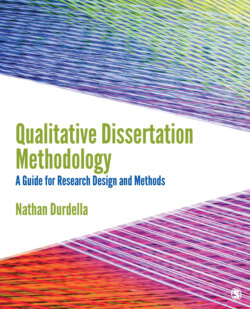Читать книгу Qualitative Dissertation Methodology - Nathan Durdella - Страница 52
На сайте Литреса книга снята с продажи.
Dissertation proposal hearing.
ОглавлениеOnce past the lock-step comprehensive exam rituals of the second or third program year (or later, in some cases), traditional dissertation rituals typically intensify. At this point—either with the successful outcome in the exam process or committee approval at the proposal hearing, students transition from doctoral student to doctoral candidate. Indeed, this proposal hearing—or defense—seems to mark the move from graduate student to early career apprentice. After all, if students can defend their research work, repel critiques of what they propose to do, and overcome objections to their design and methods—all with the support of their chair—then they have earned this new academic status. And the proposal hearing tends to occur—after committee formation and approval—irrespective of the type of dissertation, traditional or emerging form. Indeed, given the strong need to reproduce disciplinary standards for research work and norms of academic behavior, dissertation committees generally follow formal policies and informal customs that codify belief systems in the field of research and function to enforce normative expectations for early career scholarship. The specific practices that accompany the proposal hearing reify what faculty value: transparent and open process, collegial discussion and debate, critical review and evaluation of work, and developing constructive and prescriptive plans to address areas of improvement. One more cultural value undergirds the proposal hearing: trust. That is, under the apprenticeship model and supervisorial role of faculty advisors, students are expected to address committee recommendations before they go into the field and execute their study. One final set of values may appear in committee environments where faculty members identify as qualitative researchers: an epistemological orientation of social construction of reality and an interpretivist research paradigm.
